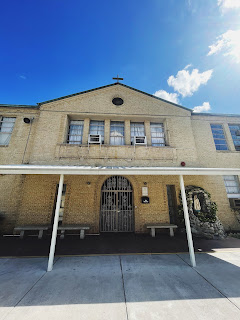April 2024: Putting the Final Touches on the St. Agnes Remodel (and the Masters Program)
It’s hard to believe how quickly this year has flown by. As we close out April and enter a new month, I, along with my classmates will be entering a new chapter in our lives as we graduate as masters of Pharmacology!
Continuing to serve at St. Agnes nearly every month this year has truly become a meaningful and personal way for me to contribute to my community. Each visit not only brings the satisfaction of tangible progress—like helping to repaint the women's shelter—but also strengthens the bonds with the Sisters who run the shelter, the residents, and other volunteers. Through our numerous shared experiences in working to beautify the building and create a safe haven for women to relax in, there's a sense of camaraderie that has grown between everyone involved. Yes, we do a lot of cleaning, painting, cooking, and organizing, but it's not just about the work done but the relationships built. In all honesty, St. Agnes has a supportive network that extends beyond the shelter’s walls. This sense of community and teamwork makes the time spent there incredibly rewarding and reaffirms the value of coming together to make a difference in the lives of others.
Over the two Saturdays I spent there this April, I was tasked with a seemingly small job of repainting Mary. She made me think about the burdens of communal living, and how small changes can make a cold environment feel warm. The women, children and men that seek shelter have been exposed to trauma. They are stressed out, and have little to no income. Often, these people also fall into minority groups with a lack of extended social networks. Imagine living in a room full of strangers who have all gone through traumatic events. Undoubtedly, there is stress and conflict; there are babies crying in the middle of night; there are women getting up early for work or going to bed late; there are even people who snore through the night. Communal living isn’t fun. On top of pre-existing (often untreated) physical conditions and illnesses, stress and lack of sleep compromise the immune system, and, if a person arrives in relatively good health, the environment itself lends itself to disease and stress. Before spiraling into the medical side of things too much—which is hard to do because, hey, I would love to be a physician who cares for people who find themselves in living situations such as this one day , and I have learned a good bit about pharmacology as well as physiology this year—I just took time to bask and be grateful to have a small part in providing a little bit of comfort and beauty to someone’s life, albeit , very small.
All in all, I will definitely miss this program, and wish the very best to my classmates and the Pharmacology Department at Tulane!




Comments
Post a Comment